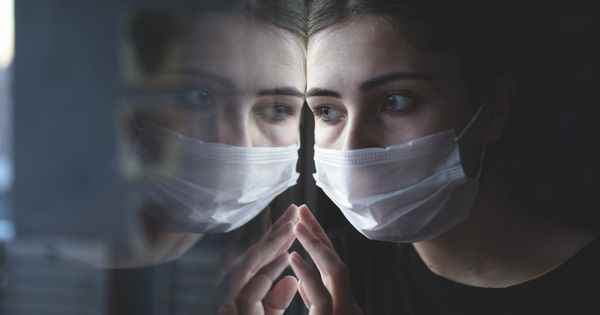Posted on 03/26/2021
3 min read
Fight effectively against the Covid-19 pandemic while limiting psychological damage: one year after the first confinement, the preservation of the mental health of the French has become a central factor in the management of the health crisis.
“We live like machines”, regrets Maru, 45, arrived in Lille at the end of 2019. For more than a year, the mother of two children, yet optimistic by nature, has been navigating between “weariness and fatigue” and “some days a lot of sadness”.
With, like many French people, the growing temptation to break the rules of confinement and curfew to go to friends to find “social link” and friendliness, which he misses so much.
Consumption of anxiolytics, sleep disorders, consultations with professionals … Mental health indicators have turned red. This winter, the plight of students, deprived of university and social life, made the headlines. The rate of depression, including severe, among employees has exploded since the start of the health crisis, according to a survey published this week.
Acceptability
“We are in a kind of generalized burnout”, summarizes Serge Hefez, psychiatrist at Pitié-Salpêtrière in Paris. For him, the population has reached its threshold of tolerance to restrictive measures, exhausted by the “permanent contradictory injunctions“, the lack of social ties and the consequences of the economic crisis.
The rejection of restrictions, “some people will internalize it (…) and leave in a depressive mode”, explains Bruno Ventelou, health economist at the Aix-Marseille School of Economics. Others go instead “externalize” , to be “in visible revolt”, he continues, citing the example of the wild carnival organized on Sunday in Marseille on Sunday.
Nicolas Franck, professor of psychiatry and practitioner at the Le Vinatier Hospital Center in Lyon, evokes a form of“individual insurrection” caused by the duration of the seizure and “the accumulation of negative factors”.
In fact, elected officials and governments now regularly display the desire to preserve the morale and mental health of the French in addition to the purely epidemiological dimension. A psychiatrist, Angèle Consoli, also entered the Scientific Council last month.
“You can’t reduce people to just work and go home. It’s inhuman”, Paris mayor Anne Hidalgo said in mid-March.
The stake is multiple: to try to limit the psychological consequences of a crisis which goes on forever, but also to maintain a certain level of acceptability of the rules. This also makes it possible not to block the economy.
Hence the “true-false containment” in several departments announced last week, with light measures that allow you to leave your home relatively freely during the day.
If some doctors immediately deemed the measures insufficient to really curb the epidemic, the psychiatrist Nicolas Franck welcomes a “compromise”: “confining outside is very good”.
“Relaxing a little (the rules) to seek a little more acceptability, even if that means having a little less control of the epidemic, that is (Emmanuel) Macron’s strategy”, emphasizes Bruno Ventelou.
Today, because they are less afraid of the virus and are exhausted, “people are ready to tolerate a little more epidemic risk to have a little less restrictions“, he believes.
“That’s why we are on a dynamic of 30,000 (new) cases per day” and not to 5,000, because the restrictions necessary to remain at this level would not have been acceptable to the population, still judges the health economist.
Consult a therapist online
What about the after?
But psychiatrists remain extremely worried and expect to have to heal the psychological wounds of the health crisis for many years, “from the mini-trauma of everyone to the post-traumatic stress of those who have seen death up close” with the Covid, according to Nicolas Franck. Serge Hefez fears “a generalized (psychic) decompensation” within a few months.
Recruitment, reimbursement of consultations with psychologists by the “Sécu”, preventive actions: “What we are waiting for are energetic measures around mental health when we have witnessed for years a gradual dismemberment” sector, continues the Parisian psychiatrist.
If the awareness by government and society of the psychological dimension “is not followed by actions, it remains wishful thinking”, he said.
.
dts6
